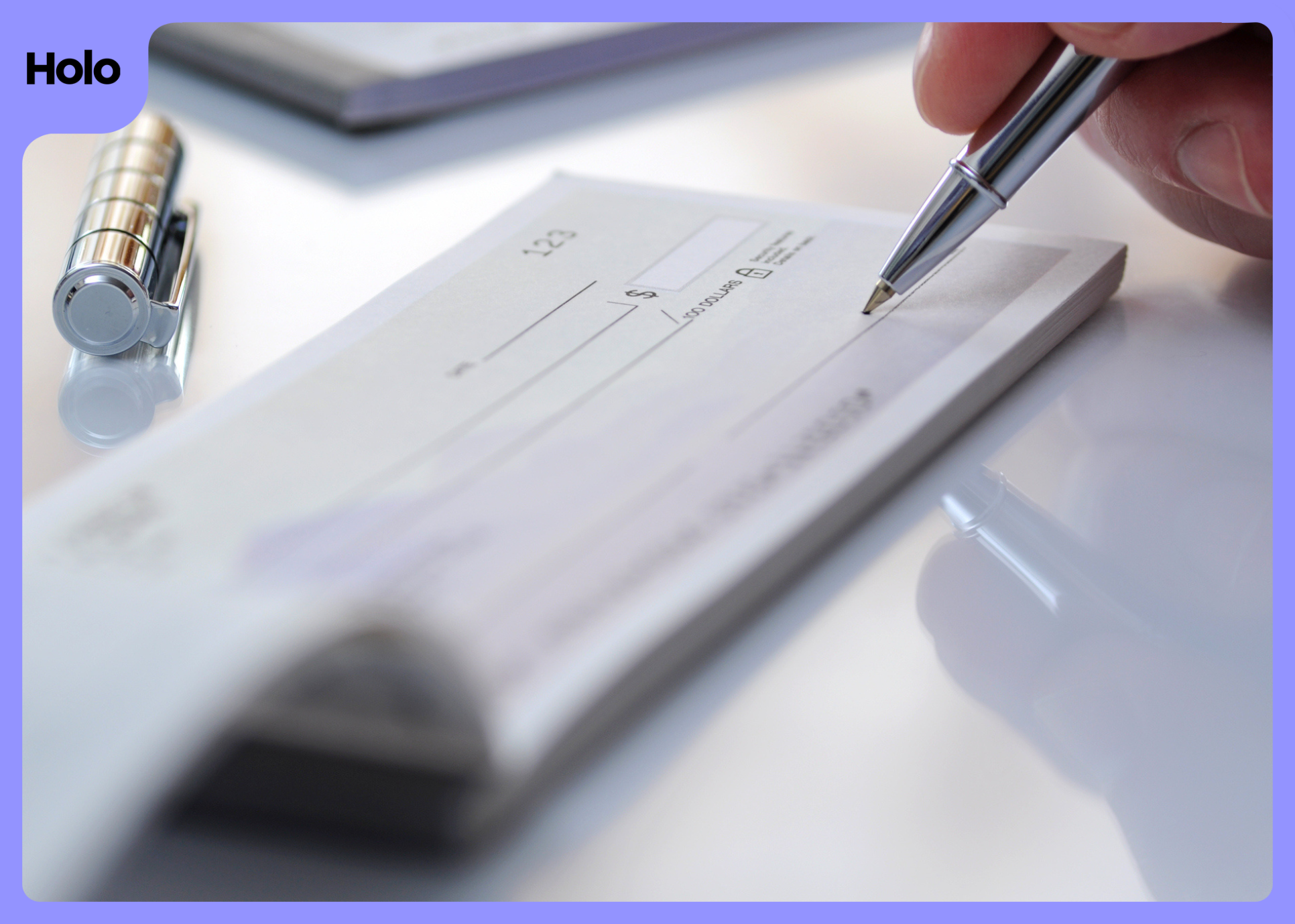
Thinking about buying a home? We've got you covered
Get expert advice today
Buying or renting a home in the UAE often involves cheques - especially security cheques. If you've been asked for one by a landlord, agent, or bank and you're not sure what it means or what could happen if something goes wrong, this guide explains everything clearly and without legal jargon.
It covers what a security cheque is and how it differs from post-dated rent cheques and deposits, when security cheques are used in rentals and mortgages, and the latest UAE rules on bounced cheques (civil versus criminal).
You'll also find practical do's and don'ts to protect yourself, the alternatives you can negotiate and when to push for them.
What is a security cheque in UAE real estate?
A security cheque is usually an undated, signed cheque given as a guarantee. In real estate, you'll see it used in two common situations:
- Rentals: A tenant may be asked for a security cheque (in addition to post-dated rent cheques and a refundable deposit) to cover unpaid rent or damages beyond the deposit.
- Mortgages: Banks commonly request a security cheque from the borrower as extra protection if repayments stop.
Key differences at a glance
- Security cheque vs. post-dated rent cheques:
- Security cheque vs. security deposit:
Is a security cheque mandatory by law?No specific law forces landlords or banks to take a security cheque - however, it's common practice in the UAE and you'll see it written into many contracts.
How security cheques are used in mortgages
If you take a home loan, most UAE banks will ask for a security cheque (often for a large amount) in addition to the standard loan agreement. The bank holds this cheque and may present it if you default on repayments.
Common bank rationale
- Extra protection if the borrower stops paying
- Simplifies recovery by giving the bank a negotiation tool or a path to civil enforcement if needed.
Some guides state the cheque may cover the full loan amount, especially on older policies, though actual practice varies by bank and product. Always check the exact amount and conditions you are agreeing to.
How security cheques are used in rentals
Typical rental payment setup
Most UAE leases are paid via post-dated cheques spread across the year. Common patterns include 1 cheque (entire year upfront), 2 cheques, 4 cheques, or 12 cheques (monthly). Paying in fewer cheques often helps you negotiate a better price.
What might your landlord ask for?
- Post-dated rent cheques (the payment schedule)
- Refundable cash deposit (usually a % of annual rent)
- Security cheque (sometimes requested in addition to the above)
Why landlords ask for a security cheque
- A stronger fallback if a tenant misses payments
- A tool to recover dues for damage beyond the deposit
- A deterrent against breach of contract (early move-out, etc.)
What should be written in the contract?
- The number of cheques and due dates
- The purpose of the security cheque (when, why and how it can be used)
- Conditions for returning the security cheque at the end of tenancy
- What happens in case of early termination or bounced cheques
The law on bounced cheques in the UAE (What changed and why it matters)
The UAE has updated how cheque disputes are handled. The big takeaway for everyday renters and buyers: many bounced-cheque cases now go the civil route rather than criminal - but there are important exceptions.
Key points:
- Decriminalisation (in many cases): Issuing a cheque without enough funds is generally treated as a civil matter rather than a criminal offence under recent amendments. This significantly changed the landscape from the old rules.
- Direct civil execution: If a cheque is returned for insufficient funds, the payee (e.g., your landlord or bank) can treat the cheque as an "execution deed" and go directly to the court's execution division to recover the amount - without needing a lengthy lawsuit first. This makes enforcement faster and more predictable.
- Criminal exceptions remain: Criminal charges can still apply in fraud-like situations - for example, forged cheques, cheques from closed/non-existent accounts, or bad-faith acts. Don't assume all cheque issues are purely civil.
What this means for you
- A security cheque is still serious: if it's banked and returns unpaid, you could face swift civil enforcement (salary attachment, asset seizure, etc., depending on the order).
- Clear paperwork and good-faith dealings matter more than ever; courts can move quickly when the documents are in order.
Best practices: How to protect yourself
If you're a tenant (or buyer)
- Before you sign
- When handing over cheques
- During the lease/mortgage
If you're a landlord (or lender)
- Put everything in the contract: purpose, storage, when it can be banked, how it will be returned
- Store cheques securely and keep a log of all cheques received/returned
- Use best-effort contact (written notice) before banking a security cheque unless the contract says otherwise; it helps avoid disputes
- On move-out/loan closure, return unused cheques promptly and issue a receipt for your tenant/borrower
Alternatives you can consider (and when they work)
Security cheques are common, but not your only option. Depending on your leverage and the party you're negotiating with, consider:
- Higher refundable deposit instead of a security cheque
- Guarantee letter (from employer or sponsor) in some cases
- Standing instructions / direct debit (for mortgages or long-term tenants)
- Shorter cheque schedules (e.g., 12 monthly cheques instead of 1-4)
- Escrowed payments via trusted third parties (rare but possible)
Tip: If you have a strong profile (long UAE history, stable job, clean payment record), you have more room to negotiate.
Real-world scenarios (What typically happens)
Scenario A: Renting a flat with 4 cheques + 1 security cheque
- You sign a 12-month lease with 4 post-dated cheques.
- The landlord also requests a security cheque to cover damages or unpaid rent beyond the deposit.
- You (sensibly) add a clause: the security cheque will be returned after the exit inspection and final bill clearance.
- You keep receipts and copies of every cheque.
- Result: You finish the lease, pass inspection, the landlord returns the security cheque, and everyone's happy.
Scenario B: Mortgage with a bank security cheque
- You take a mortgage. The bank asks for a security cheque as backup.
- You ensure the amount and triggers for banking the cheque are clearly stated in the loan offer letter.
- If a hardship arises, you notify the bank early and discuss rescheduling rather than risking a bounce.
- Because the rules allow direct execution for insufficient funds, you work hard to avoid any bounce while a restructuring is agreed.
Key takeaways
- A security cheque is a guarantee, not a routine payment cheque
- It's common in UAE rentals and mortgages - but negotiate the terms
- The UAE has modernised cheque laws: many bounces are handled civilly, and payees can pursue direct execution for insufficient funds
- Criminal risk still exists for fraud or bad faith
- Protect yourself with clear contract language, proper records, and early communication
- Consider alternatives (higher deposit, direct debit, different cheque schedules) where possible
Conclusion
A security cheque isn't something to fear - but it does deserve your attention. Whether you're moving into your first apartment or buying a new villa, make sure the contract is clear, you know your dates and amounts, and you've asked for alternatives if a security cheque makes you uncomfortable.
With the UAE's newer rules, enforcement is faster and more civil, which is great when documents are accurate and everyone acts in good faith. If in doubt, get a quick legal review of your lease or loan offer before you hand over any cheque.
Related articles

Best AI Tools for Real Estate Agents in Dubai: The 2025 Playbook to Close More Deals

How to Invest Money in the UAE to Generate Wealth: 2025 Guide


